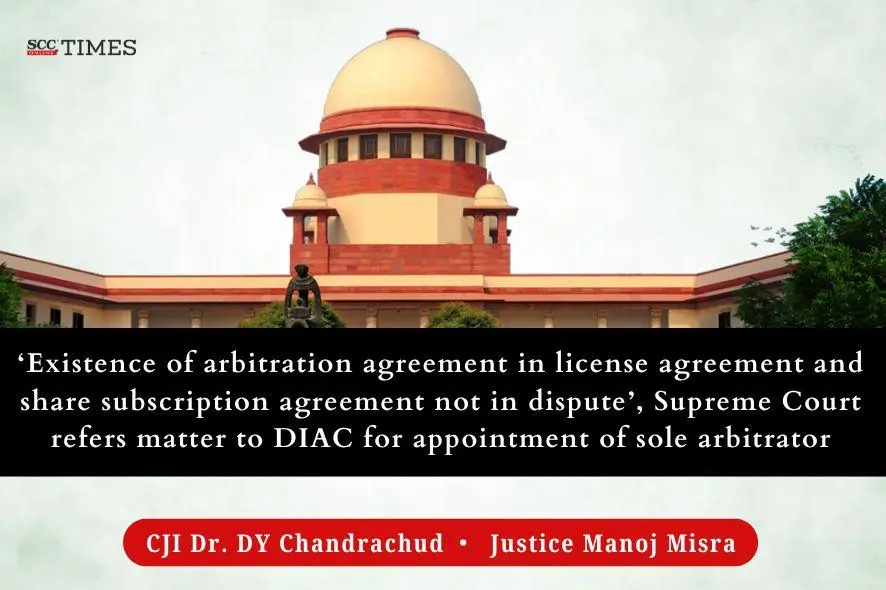Supreme Court: In an arbitration petition, the division bench of Dr. D.Y. Chandrachud, CJI and Manoj Misra*, J. said that since at the stage of consideration of a prayer under Section 11(6) of the Arbitration and Conciliation Act, 1996 (‘Act, 1996’) , the Court has to confine itself to the examination of the existence of an arbitration agreement, it would not be appropriate for it to delve deep into the issue as it could well be considered by the arbitrator on the basis of evidence led by the parties. More so, when existence of arbitration agreement in the license agreement and share subscription agreement is not in dispute. Therefore, the Court referred the matter to the Delhi International Arbitration Centre for the appointment of a sole arbitrator to adjudicate upon the dispute between the parties.
Background:
A company duly incorporated under the laws of the United States of America invoked the jurisdiction of this Court under sub-sections (6) and (12) of Section 11 of the Act, 1996 for appointment of a sole arbitrator in terms of arbitration clause stipulated in the agreements dated 27-12-2009 and 11-02-2010 to adjudicate upon the disputes between the petitioner and the respondents.
The company’s case inter alia is that it purchased the assets of Cryobank International, Inc on 8-06-2010 at a public auction in pursuance of a decree dated 5-05-2010 passed by the Circuit Court of Florida, USA. Following which, a certificate of title was issued in its favor certifying purchase of all assets, tangible and intangible, of Cryobank USA by it. On the basis thereof, the petitioner company claims to have stepped into the shoes of Cryobank USA. According to the petitioner company, the dispute between them and the respondents stems from Exclusive and Perpetual License Agreement and Share Subscription and Shareholders Agreement. Under both the arbitration agreements the disputes are referable to a sole arbitrator subject to the jurisdiction of courts at Delhi.
It is the case of the petitioner company that under the license agreement, the respondents were entitled to use Cryobank’s intellectual property rights in lieu of consideration which included issue of shares in the respondent company. It is stated that the company stepped into the shoes of Cryobank USA, and this fact was acknowledged by the respondent company in various correspondences. However, since the company’s demand was not met, arbitration clause had to be invoked vide notice dated 29-09-2017.
In response to the notice of these proceedings, the respondents’ case inter alia is that the license agreement was non-assignable, and the respondents have not accepted the company as the assignee. There is, therefore, no privity of contract. Hence, the petition is liable to be dismissed.
Analysis and Decision:
The Court said that at the stage of considering an application for appointment of an arbitrator the Court is required to examine whether there exists an arbitration agreement between the parties. However, the existence of an arbitration agreement is not an issue. The issue is that it is not between the petitioner company and the respondent company but between Cryobank USA and the respondents. According to the respondents the petitioner company has only bought assets of Cryobank USA but, in absence of respondents’ consent, has not stepped into the shoes of Cryobank USA.
The Court noted that the petitioner company has referred to several documents/correspondences to canvass that the respondent has accepted as having stepped into the shoes of Cryobank USA. The petitioner company has also annexed a certificate to indicate that rights under all existing contracts including intellectual property rights of Cryobank USA were purchased by the petitioner company in auction sale.
The Court took note of Khardah Company Ltd. v. Raymon & Co (India) Pvt. Ltd., AIR 1962 SC 1810, wherein it was held that an assignment of a contract might result by transfer either of the rights or of the obligations thereunder. But there is a well-recognized distinction between these two classes of assignments. As a rule, obligations under a contract cannot be assigned except with the consent of the promise, and when such consent is given, it is really a novation resulting in substitution of liabilities. On the other hand, the rights under a contract are assignable unless the contract is personal in its nature, or the rights are incapable of assignment either under the law or under an agreement between the parties.
The Court mentioned that since at the stage of consideration of a prayer under Section 11(6) of the 1996 Act the Court has to confine itself to the examination of the existence of an arbitration agreement (vide sub-section (6-A) of Section 11), it would not be appropriate for it to delve deep into the issue as it could well be considered by the arbitrator on the basis of evidence led by the parties. More so, when existence of arbitration agreement in the license agreement and share subscription agreement is not in dispute.
Therefore, the Court referred the matter to the Delhi International Arbitration Centre for the appointment of a sole arbitrator to adjudicate upon the dispute between the parties.
CASE DETAILS
|
Citation: Appellants : Respondents : |
Advocates who appeared in this case For Petitioner(s): For Respondent(s): |
CORAM :









